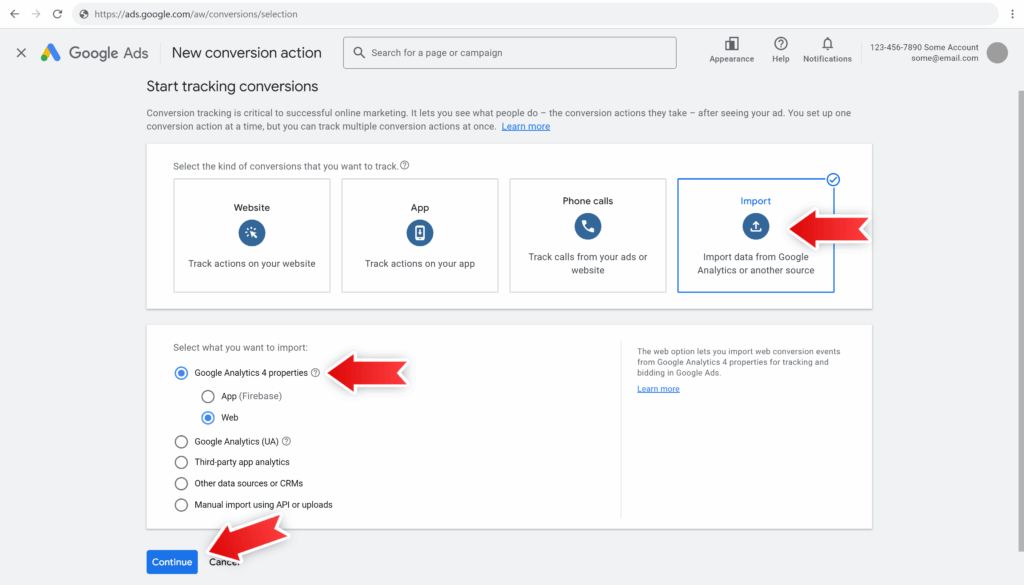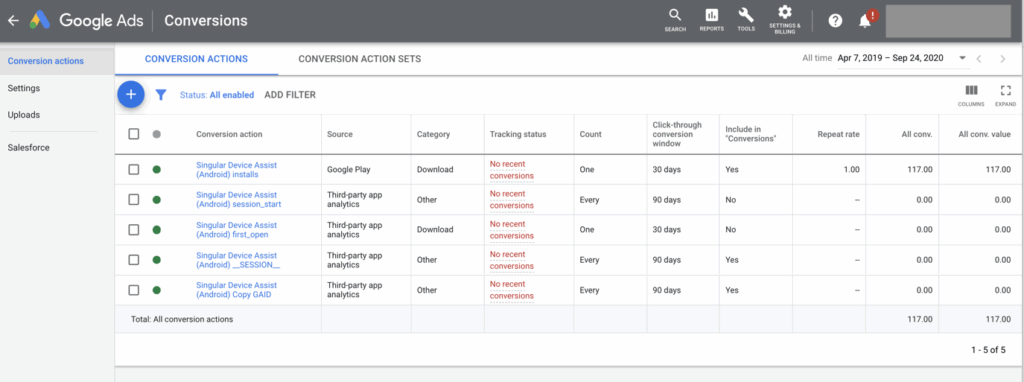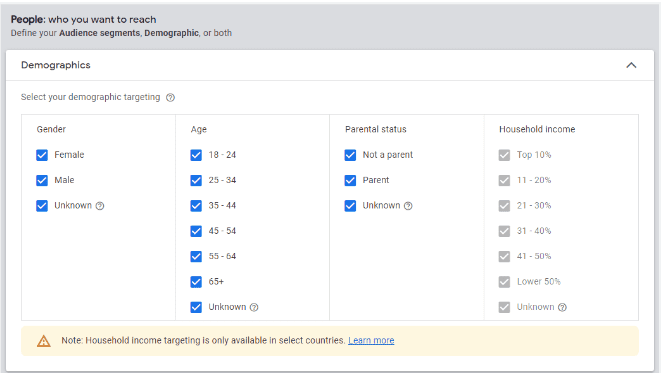How to advertise an event on Google

In today’s digital era, organizing a successful event depends not only on the program’s content but also on how effectively it is promoted. One of the most modern and popular methods today is advertising events on Google. So, what is this form of advertising, and how to advertise an event on google. Let’s explore more with Rentads in today’s article!
Answering the question: What is event advertising on Google?

Event advertising on Google is a form of paid media through the Google Ads platform, aimed at reaching the right target audience for programs such as seminars, conferences, concerts, expos, trial classes, product launches, or online webinars. By investing in ad budgets, your event information can appear across multiple channels within the Google ecosystem, including:
- Google Search
- Google Display Network
- YouTube
- Gmail
- Google Discover
The key strength of Google advertising lies in its ability to target specific audiences based on location, age, keywords, search behavior, and interests, helping your event attract relevant attendees and increase engagement.
Overview of popular Google ad formats for event promotion
When launching an ad campaign for an event, choosing the right Google ad format plays a crucial role in determining its success. Google Ads provides various advertising options tailored to each stage of the user journey—from awareness and interest to registration or ticket purchase. Below is a summary of the most commonly used Google ad formats for events that help businesses maximize communication effectiveness.
Search ads
Search ads appear when users type keywords related to your event on Google. These are simple text-based ads that can be highly persuasive, typically including a headline, description, and a link to the registration page or event landing page. This format is ideal for targeting users who are actively searching for event information, such as “technology seminar,” “free startup workshop,” or “buy concert tickets.” Thanks to keyword targeting, search ads usually offer a high conversion rate and are suitable for the “intent to participate” stage of the customer journey.
Display Ads
Display ads are image-based formats like banners or animated GIFs that appear across millions of websites and apps in Google’s display network. This format is perfect for reaching people who may not yet know about your event but have shown relevant behaviors or interests. For example, if you’re hosting a finance seminar, your ad can appear on economic news websites, investment blogs, or banking apps. Display ads not only increase brand awareness for your event but also strongly support remarketing campaigns by reminding users who previously visited your page but haven’t registered.
YouTube advertising
With its massive user base and the powerful ability to convey emotions through motion pictures, advertising on YouTube is one of the most effective channels to promote events. Ads can appear as short videos before, during, or after the main video the user is watching, or be displayed on the YouTube homepage and in search results. You can use event teasers, speaker interview videos, or program trailers to create a strong first impression. YouTube advertising is especially suitable for events that aim to create emotions, spark curiosity, or deliver strong inspiration to viewers.
Discovery Ads
Discovery ads are a relatively new but promising format, allowing ads to appear naturally across content discovery platforms such as YouTube (homepage), Gmail (social or promotions tab), and Google Discover (within the Google app on mobile). Discovery ads use machine learning technology to predict what content users may be interested in, thereby delivering event promotions to the right audience even if they haven’t actively searched for them. This is a great option to increase brand visibility and spark initial interest at a reasonable cost.
Performance Max advertising
Performance Max is currently the most comprehensive advertising format within the Google ecosystem. It allows you to deliver event-related content across multiple platforms at once, including Google Search, YouTube, Display, Gmail, Discover, and Google Maps. You only need to provide creative assets such as images, headlines, videos, and descriptions. Google will automatically combine and optimize these elements for the best performance. With the support of artificial intelligence and multi-layered user data, Performance Max helps save campaign management time while ensuring your ads reach the right audience at every touchpoint in the customer journey.
How to advertise an event on Google

To run effective event ads on Google, you can follow these steps:
Step 1: Identify the audience interested in the event
When launching any advertising campaign, experts recommend starting by clearly identifying your target audience. This is a crucial step that helps save budget and optimize performance. You need to carefully analyze: who is likely to be interested in the event? How old are they? Where do they live? What is their occupation? Do they have interests or behaviors related to the event content? Google Ads allows you to target by age, gender, location, device, language, interests, and even browsing behavior. Clearly defining your customer persona will help you create campaigns that match actual demand — reaching the right people at the right time.
Step 2: Highlight the core value of the event
Build your ad content around the core values of the event. Users will not participate unless they see clear benefits. Therefore, you need to list the most outstanding points: what makes the event special? Who are the guest speakers? What knowledge will be shared? What will participants learn or experience? Experts often suggest answering the question: “Why should I register for this event?” before writing your ad copy. By emphasizing practical benefits and unique value, you increase your chances of attracting registrations.
Step 3: Choose the right platform for your target audience
Not every Google platform is suitable for all types of events. That’s why advertising professionals always consider selecting the most appropriate platform based on the target audience. If you’re targeting people actively searching for events, use Google Search Ads. If your goal is to increase brand awareness among those who haven’t heard of the event yet, choose Display Ads or YouTube Ads. For events that require strong viral potential, Discovery Ads or Performance Max will help expand your reach through AI-powered optimization. Choosing the right distribution channel will help your campaign achieve results faster and at a reasonable cost.
Step 4: Set up tools to track your campaign
An effective ad campaign must include measurement and tracking. Experts strongly recommend setting up tools such as Google Analytics, Google Tag Manager, and conversion tracking in Google Ads to monitor registrations, ticket sales, click-through rate (CTR), cost per acquisition (CPA), and more. Proper tracking allows you to assess each campaign’s performance, giving you the insights needed to adjust content, ad formats, or audience segments accordingly.
Step 5: Advertise each stage of the campaign
The customer journey typically includes multiple stages: from awareness, interest, to action. Therefore, advertising experts often create ad content tailored to each stage of the funnel. In the awareness stage, you should focus on display ads or videos with inspirational messaging. Once users are aware of the event, retarget them with remarketing ads that include stronger calls to action such as “Only 2 days left to register!” or “Get 50% off early bird tickets today.” Segmenting content by funnel stage helps increase conversion rates and avoid budget waste.
Step 6: Customize goals for each ad
A successful advertising campaign requires precise targeting. Experts usually configure detailed targeting settings such as: location (radius around the event), age, gender, device, ad scheduling, and audience types (in-market audiences, affinity audiences…). If the event is nationwide or online, you can expand the targeting. If it’s local, restrict the display area to save costs. In addition, Google allows you to exclude irrelevant groups to ensure the ads are not wasted.
Step 7: Optimize the landing page and run A/B testing
The landing page is where users make their final decision: to register or leave. Therefore, you need to invest carefully in its design, content, and user experience. An effective landing page should include a clear headline, detailed event information, illustrative images or videos, a prominent call to action (CTA), a simple form, and a privacy assurance. Additionally, experts often run A/B testing to compare different versions of the landing page and select the one with the highest conversion rate. This is an essential strategy to maximize ROI (return on investment) in Google advertising.
Advertising events on Google not only helps you reach the right audience at the right time but also significantly increases registrations and revenue. By choosing the right ad format, targeting the right audience, and closely monitoring campaign performance, you can easily turn an ordinary event into a remarkable success. Don’t forget to continuously optimize and test to achieve the best performance for every campaign.
Contact Info
Are you in need of Facebook advertising or need to rent a quality Facebook advertising account? Don’t worry! Rentads is a unit specializing in providing reputable Facebook accounts, as well as direct advertising support. Provides all types of advertising accounts such as google ads agency account for rent to help you reach and create fast conversions.
Frequently Asked Questions
Running web ads is not too difficult, but it requires a clear understanding of your goals, target audience, and how to set up an effective campaign. If you’re just starting, platforms like Google Ads or Facebook Ads offer user-friendly interfaces and step-by-step instructions. However, to run truly effective ads, you need to know how to optimize your budget, choose the right keywords, create engaging content, and regularly monitor and adjust your campaign. So, running web ads can be easy if you’re willing to learn or get support from experts.
To find optimal keywords for Google Ads, you should start with the Google Keyword Planner tool to discover keywords with high search volume and suitable competition levels. Additionally, study the search behavior of your potential customers by analyzing common phrases they use when looking for your product or service. Don’t forget to use long-tail keywords to better reach the right audience and reduce ad costs. Combining tools like Google Trends, Ahrefs, or SEMrush can help you choose more accurate and effective keywords.